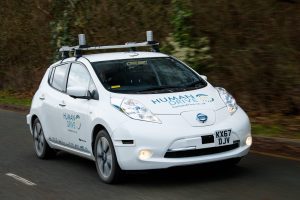
Nissan Leaf completes the UK’s longest and most complex autonomous journey
- UK Government-backed, Nissan Europe-led consortium HumanDrive, comes to its conclusion
- Collaborative project explores how new technologies can make autonomous vehicle systems feel human-like and natural
- UK project team achieves major milestone with the completion of the Grand Drive – a 230 mile autonomous journey across the UK
- The Grand Drive route included a number of UK unique road environments, such as complex roundabouts and high-speed country lanes with no road markings, white lines or kerbs
A British-based research project into the latest autonomous vehicle technologies has successfully completed a 230-mile self-navigated journey on UK roads.
The project, HumanDrive, is jointly funded by UK government through the Centre for Connected and Autonomous Vehicles (CCAV) and Innovate UK, and nine other consortium partners. The joint funding package for the project totalled £13.5m.
The research project has successfully completed two trials, a 230-mile self-navigated journey on UK roads – ‘Grand Drive’ – using advanced positioning technology and also a test track based activity which explored human-like driving using machine learning to enhance the user experience.
The test vehicles included Nissan LEAFs, featuring GPS, radar, LIDAR and camera technologies that build up a perception of the world around it. Using that perceived world, the system can make decisions about how to navigate roads and obstacles it encounters on a journey.
Grand Drive in Detail
The first element of the project was the ‘Grand Drive’ from Cranfield, Bedfordshire, to Sunderland. The achievement was the culmination of 30 months’ work by the HumanDrive consortium – a team led by Nissan engineers in the UK, working in partnership with consortium members.
One of the key aspects of the project was to develop an advanced, autonomous vehicle control system. Ensuring that future advanced autonomous drive systems create a comfortable and familiar experience for customers is important as we move towards a more connected and autonomous future.
The 230 mile journey saw the lessons learned put into practice in a range of driving scenarios to negotiate country lanes with no or minimal road markings, junctions, roundabouts and motorways. The autonomous technology activated along the route to change lanes, merge and stop and start when necessary.
Bob Bateman, Project Manager for Nissan Technical Centre, Europe, said:
“The HumanDrive project allowed us to develop an autonomous vehicle that can tackle challenges encountered on UK roads that are unique to this part of the world, such as complex roundabouts and high-speed country lanes with no road markings, white lines or kerbs.”
The Grand Drive was achieved as the UK-based consortium members worked together to investigate how autonomous driving can emulate a natural, human-like driving style.
HumanDrive and Machine Learning
The second part of the HumanDrive project looked at how machine-learning Artificial Intelligence technologies could enhance the user experience and passenger comfort of connected and autonomous vehicles. Pilot vehicles tested successfully on private tracks also incorporated artificial intelligence systems developed by fellow consortium member Hitachi Europe Ltd, which enable real-time machine-learning. By building a dataset of previously encountered traffic scenarios and solutions, it can use this ‘learned experience’ to handle similar scenarios in future and plot a safe route around an obstacle.
These technologies were subjected to a robust testing process and developed using a range of facilities, including simulation, hardware in the loop, private test tracks.
Business Minister, Nadhim Zahawi said:
“Safely completing the longest autonomous drive in Britain is an incredible achievement for Nissan and the HumanDrive consortium, and a huge step towards the rollout of driverless cars on UK streets.
“This project is a shining example of how the automotive industry, working with government, can drive forward technology to benefit people’s mobility – while helping to slash carbon emissions.”
Future of Transport Minister, George Freeman said:
“The UK is fast becoming a leader in intelligent and automated vehicle and traffic management technology, a huge global sector set to create thousands of jobs.
“Our Future of Mobility: Urban Strategy is supporting transport innovation for cleaner, greener and smarter transport, and Nissan’s successful HumanDrive project is an exciting example of how the next phase of the UK’s transport revolution could look.”
HumanDrive also went beyond the development of autonomous drive technology. The research also focused on advancing cyber security features in AD vehicles, developing testing and safety methodologies for UK AD testing and investigating the implications of AD vehicles on the wider transport system.
HumanDrive and Nissan
While remaining a UK-based research project for now, the lessons learned from HumanDrive will help inform future AD systems.
Today, the new Nissan JUKE, LEAF, Qashqai and X-Trail models are all available with ProPILOT, a Nissan Intelligent Mobility technology and enhances a driver’s control by assisting with steering, acceleration and braking. It works in a single lane on highways, and is optimised for low-speed congestion and high-speed cruising.
By liberating drivers from some of the more mundane elements of motoring, ProPILOT helps to reduce fatigue and stress, whilst improving safety and enhancing control and confidence.
David Moss, Senior Vice President for Research & Development in Europe, Nissan Europe, said: “Nissan’s Intelligent Mobility vision is to develop autonomous drive technologies for use in all of our cars in any area of the world. The door is now open to build on this successful UK research project, as we move towards a future which is more autonomous, more electric, and more connected.”
HumanDrive project consortium members and areas of expertise
- Nissan. Lead partner and leading the autonomous vehicle (AV) development
- Hitachi. Artificial Intelligence (AI) to provide human-like control and perception
- University of Leeds. Understanding humanistic driving and its application to AVs whilst also developing a driver risk model
- Connected Places Catapult (CPC). Project management, communications and marketing activity, dissemination and safety case elements of the project
- HORIBA MIRA. Provider of test facilities, supported safety aspects of the project
- SBD Automotive. Cyber security support and AV Human machine Interface (HMI) studies
- Cranfield University. Provider of test facilities and supported AV demonstrations
- Atkins Ltd. Provision of a Cyber Security Framework
- Aimsun Ltd. Studying the impact of AVs on the transport system
- Highways England. Understanding the infrastructure needs for AV deployment
ENDS
NOTES TO EDITORS
The Grand Drive journey was successfully completed on 28th November 2019, with two engineers on board and monitoring the vehicle’s actions at all times. Both were fully trained to conduct autonomous vehicle testing, with one behind the wheel and ready to take control if required, and the second supervising the car’s control and monitoring systems. The Grand Drive journey was also conducted with the knowledge and support of all relevant highway authorities.
ADDITIONAL QUOTES FROM HUMANDRIVE CONSORTIUM PARTNERS:
Nick Blake, Chief Innovation Strategist, Hitachi Europe Ltd
“Hitachi European R&D developed pioneering AI technology to exploit the plethora of driving data generated from modern cars to improve the comfortability and safety of future autonomous vehicles.”
Professor Natasha Merat, Chair in Human Factors of Transport Systems at the University of Leeds
“The main aim of the project is for the HumanDrive car to travel in a way that is comfortable, natural and ultimately trustworthy for the user. Integrating human-like controllers in automated vehicles will provide a smoother, more comfortable, experience for drivers and our algorithm development is trying to achieve this, along with an understanding of what people want from an automated driving experience. Using our state-of-the-art driving simulator, we have spent the past 30 months developing new control models for automated vehicles, using data from a range of participants, which are then evaluated by drivers and compared to a recording of their own drive.”
Nicola Yates OBE, Connected Places Catapult CEO
“The HumanDrive Connected & Autonomous vehicle project is a fantastic demonstration of the UK’s ability to deliver world leading innovation projects. HumanDrive has bought together a world class consortium incorporating large organisations, SMEs and academia that has taken autonomous technology to the next level in terms of ride comfort, safety and adaptability, covering a number of different road scenarios with natural road positioning. The Connected Places Catapult have been honoured to use our expertise alongside our partners on the development and deployment of this ground breaking technology, a technology that has the potential to make a real step change in our capacity to connect people.”
Mark Brackstone, Research Project Manager, AIMSUN
“Aimsun has been investigating the likely impact of CAVs through the use of microscopic simulation models of England’s Strategic Road Network (SRN). We have examined the impact of CAVs on groups of road users and vehicles with varying percentages and types of equipped vehicles and seeing how these affect the speed and density of both the CAV, and non-CAV traffic. This has provided stakeholders with data for basic cost-benefit assessments in order to judge steps needed in planning for the introduction of CAVs to the road network.”
Dr Wolfgang Schuster, Intelligent Mobility Technical Director, Atkins
“Human Drive has made significant contributions towards setting the standards for a cyber security framework that will be fundamental to the development of end-to-end certification frameworks for the future of mobility ecosystem. I think it is fair to say that Human Drive has made a huge step towards enabling the safe and secure rollout of CAVs on UK roads.”
Professor James Brighton, Head of the Advanced Vehicle Engineering Centre, Cranfield University
“Cranfield’s role in this project has been to develop ways of measuring human-like driving behaviour and then verify that this is reflected in the autonomous driving style of the cars. Our Multi-User Environment for Autonomous Vehicle Innovation (MUEAVI) – a ‘smart’ road test environment, which is a first of its kind in the UK, built alongside a research airport within the controlled setting of a University campus – has been used extensively throughout the project to analyse and fine-tune the autonomous vehicle’s perception and control systems that have produced the human-like driving characteristics. The project has also provided our Automotive Engineering and Mechatronics MSc students with an opportunity to gain hands-on experience with the technology that will define the next generation of automotive vehicles.”
Dr Joanna White, Head of Intelligent Transport Systems, Highway’s England
“We were delighted to be part of the HumanDrive consortia and welcomed the opportunity to be involved in this interesting project. We had two roles, ensuring the trial was undertaken safely on our network and; working with Aimsun to model the impact of autonomous vehicles on our network. As the network operator we are supporting a range of projects as part of our digital roads programme, which will help us define what the roads of the future will look like. This will help in the movement of people and goods across the network – connecting the country better.”
David McClure, Head of Cyber Security, SBD Automotive
“HumanDrive has helped to place the UK on the map in terms of autonomous vehicle development, and in particular focusing minds on making the ‘ride’ experience as close to a human-driven car as possible. SBD’s role in the project was to think about the cyber threats that could face a production version of the HumanDrive system, and to develop an over-arching security concept that will help protect future autonomous vehicles from malicious attack. As experts in connected and autonomous vehicles, SBD Automotive has a niche offering compared to more generalist cyber companies. We plan to use our involvement in HumanDrive to raise awareness of our capability and to further differentiate our services from the mass market of generic pen testing companies.”
Richard Hillman, Principal Engineer for Connected and Autonomous Vehicles, Horiba Mira
“HumanDrive has enabled HORIBA MIRA to develop our ability to replicate within the safe and controlled environment of our proving ground the complex scenarios seen on public roads, and to develop a process to interrogate an autonomous vehicle’s functionality thoroughly and efficiently. Not only has the HumanDrive project demonstrated that the UK is a great place to test autonomous vehicles – with some challenging roads and strong support from the government – but we’ve pushed the boundaries of what these autonomous systems can do. The learning from the project is helping to inform national and international discussions around the safety and security of connected and autonomous vehicles and their future regulations.”
CONSORTIUM PARTNERS OVERVIEW & COMMUNICATIONS CONTACT
ABOUT NISSAN EUROPE
Nissan has one of the most comprehensive European presences of any overseas manufacturer, employing more than 16,000 staff across locally based design, research & development, manufacturing, logistics and sales & marketing operations. In 2018, Nissan plants in the UK, Spain and Russia produced about 600,000 vehicles including award-winning crossovers, commercial vehicles and the Nissan LEAF, Europe’s most selling electric vehicle in 2018. Pursuing a goal of zero emissions and zero fatalities on the road, Nissan is leading the field with its vision of Intelligent Mobility. Designed to guide Nissan’s product and technology pipeline, this 360 degree approach to the future of mobility will anchor critical company decisions around how cars are powered, how cars are driven, and how cars integrate into society.
For more information about our products, services and commitment to sustainable mobility, visit nissan-global.com You can also follow us on Facebook, Instagram, Twitter and LinkedIn and see all our latest videos on YouTube.
ABOUT NISSAN MOTOR CO., LTD.
Nissan is a global full-line vehicle manufacturer that sells more than 60 models under the Nissan, INFINITI and Datsun brands. In fiscal year 2018, the company sold 5.52 million vehicles globally, generating revenue of 11.6 trillion yen. Nissan’s global headquarters in Yokohama, Japan, manages operations in six regions: Asia & Oceania; Africa, the Middle East & India; China; Europe; Latin America; and North America. Nissan has partnered with French manufacturer Renault since 1999 and acquired a 34% stake in Mitsubishi Motors in 2016. The Renault-Nissan-Mitsubishi alliance sold 10.76 million vehicles combined in calendar year 2018.
Kayleigh Edwards
Communications, Nissan Technical Centre Europe
Kayleigh.Edwards@ntc-europe.co.uk
+44 1234 755860
ABOUT HITACHI EUROPE LTD
Hitachi, Ltd. (TSE: 6501), headquartered in Tokyo, Japan, delivers innovations that answer society’s challenges. The company’s consolidated revenues for fiscal 2016 (ended March 31, 2017) totalled 9,162.2 billion yen ($81.8 billion). The Hitachi Group is a global leader in the Social Innovation Business, and it has approximately 304,000 employees worldwide. Through collaborative creation, Hitachi is providing solutions to customers in a broad range of sectors, including Power / Energy, Industry / Distribution / Water, Urban Development, and Finance / Government & Public / Healthcare. For more information on Hitachi, please visit the company’s website at http://www.hitachi.com
Kelly Smith
Hitachi Europe Ltd
+44 1628 585379
ABOUT UNIVERSITY OF LEEDS
The University of Leeds is one of the largest higher education institutions in the UK, with more than 38,000 students from more than 150 different countries, and a member of the Russell Group of research-intensive universities. The University plays a significant role in the Turing, Rosalind Franklin and Royce Institutes. www.leeds.ac.uk
Virtuocity is a centre for city simulation bringing together expertise from the University of Leeds’ major research facilities, including the University of Leeds Driving Simulator and Leeds Institute for Data Analytics. The centre is hosted by members of the Institute for Transport Studies (ITS), a free-standing academic department of the University of Leeds and part of the Faculty of Environment, with a multidisciplinary team of internationally-recognised researchers working to accelerate the creation of innovative solutions in mobility, focussing particularly on improving the design of future automated vehicles, using a human-centred approach.
Anna Harrison
University of Leeds
+44 113 34 34196
ABOUT THE CONNECTED PLACES CATAPULT
The Connected Places Catapult accelerates smarter living and travelling in and between the places of tomorrow. We focus on growing businesses with innovations in mobility services and the built environment that enable new levels of physical, digital and social connectedness. The Connected Places Catapult operates at the intersection between public and private sectors and between local government and transport authorities. We convene the disparate parts of the market to help innovators navigate the complexity of doing business, creating new commercial opportunities and improving productivity, socio-economic and environmental benefits for places. Visit cp.catapult.org.uk for more information
Stephen Lynn
Connected Places Catapult
Stephen.Lynn@cp.catapult.org.uk
+44 7496 437907
ABOUT AIMSUN
Aimsun is a leading international provider of software and services for traffic planning, simulation and prediction. The company’s integrated Aimsun Next mobility modelling software provides an accurate and cost-effective simulation environment for testing connected and autonomous vehicles; it is the perfect tool for investigating the impacts of different CAV systems, including vehicle management and control strategies, as well as the impact of robustness issues such as information delays, data integrity, and black spots in connectivity and communications. Aimsun has nine offices worldwide and over 5400 users, including government agencies, consultancies and research institutions, with the UK team leading the way in CAV R&D through involvement in InnovateUK projects. Within HumanDrive, Aimsun is working with Highways England to investigate the effect of CAVs on the strategic road network via the implementation of a simple CAV control strategy within a new class of vehicles in an extensive simulated network. The two networks selected for testing represent a motorway (the M1 around Sheffield) and another a more complex A road configuration in the Sunderland area (A19), which contains roundabouts and signalised junctions. The microscopic impact of CAVs on differing groups of road users will be investigated in the peak period, and variables such as following headway and deceleration limits varied in order to see how the percentage and characteristics of the equipped vehicles affect capacity (speed, headway etc) and even emissions Key Performance Indicators (KPIs) of both the CAV, and non-CAV traffic; this provides a basic cost-benefit assessment for stakeholders to judge steps needed in planning for the appearance of CAVs on the road network. The model has been prepared during 2018, with simulations undertaken in 2019. For more information visit www.aimsun.com
Nadia Feddo
Aimsun
+34 933 171 693
ABOUT ATKINS
Atkins (www.atkinsglobal.com), member of the SNC-Lavalin group, is one of the world’s most respected design, engineering and project management consultancies, employing some 18,300 people across the UK, North America, Middle East, Asia Pacific and Europe. We build long term trusted partnerships to create a world where lives are enriched through the implementation of our ideas. You can view Atkins’ recent projects at http://www.atkinsglobal.com/en-GB For more information about Atkins’s approach to autonomous vehicles and Intelligent Mobility, please visit our website and iM Hub: www.atkinsglobal.com/im Founded in 1911, SNC-Lavalin is a global fully integrated professional services and project management company and a major player in the ownership of infrastructure. From offices around the world, SNC-Lavalin’s employees are proud to build what matters. Our teams provide comprehensive end-to-end project solutions – including capital investment, consulting, design, engineering, construction, sustaining capital and operations and maintenance – to clients in oil and gas, mining and metallurgy, infrastructure and power. On July 3, 2017, SNC-Lavalin acquired Atkins, one of the world’s most respected design, engineering and project management consultancies. www.snclavalin.com
Alicia de Haldevang
Atkins
Alicia.DeHaldevang@atkinsglobal.com
+44 7581 814597
ABOUT CRANFIELD UNIVERSITY
Cranfield is a specialist postgraduate university that is a global leader for education and transformational research in technology and management. Cranfield has over 60 years’ experience in transport, including the aviation, automotive, motorsport, military and marine sectors. Our Multi-User Environment for Autonomous Vehicle Innovation is a £9 million ‘smart’ roadway test environment for the development of intelligent and autonomous vehicles, the first of its kind in the UK next to an airport and within the controlled setting of a university campus. It includes the associated systems needed to integrate emerging technologies into our day-to-day lives. Cranfield University is working at the forefront of research and teaching in motorsport, automotive engineering and mechatronics. Courses include the Automotive Mechatronics MSc, the Automotive Engineering MSc, and the new Connected and Autonomous Vehicle Engineering (Automotive) MSc. https://www.cranfield.ac.uk/themes/transport-systems/courses
www.cranfield.ac.uk/transportsystems
@CranfieldUni
Kath Middleditch
Cranfield University
K.A.Middleditch@cranfield.ac.uk / mediarelations@cranfield.ac.uk
+44 1234 754594
ABOUT HIGHWAYS ENGLAND
We are the government company charged with modernising, operating, maintaining and improving England’s motorways and major A roads. Our road network totals around 4,300 miles. While this represents only 2% of all roads in England by length, these roads carry a third of all traffic by mileage and two thirds of all heavy goods traffic. England’s major road network forms the economic backbone of the country; is open 24 hours a day, seven days a week; is relied on by communities and businesses across the country. For more information visit www.highwaysengland.co.uk
Jon Moore
Highways England
jon.moore@highwaysengland.co.uk
+44 7787 152284
ABOUT SBD AUTOMOTIVE
SBD Automotive is a global consultancy firm specialising in automotive technologies. For over 20 years, our independent research, insight, and consultancy has been helping vehicle manufacturers and their partners to create smarter, more secure, better connected, and increasingly autonomous cars. Having built a reputation for robust data and expert advice, as well as an ability to attract and retain the industry’s most talented specialists, SBD Automotive recently received the Queen’s Award for Enterprise – a much-coveted award for outstanding achievement by UK companies. If you would like to learn more, please visit www.sbdautomotive.com
Chris Atkinson
SBD Automotive
ChrisAtkinson@sbdautomotive.com
+44 1908 305107
ABOUT HORIBA MIRA
HORIBA MIRA is a global provider of pioneering engineering, research and test services to the automotive, defence, aerospace and rail sectors. We work in close collaboration with vehicle manufacturers and suppliers around the world, providing comprehensive support ranging from individual product tests to turnkey multi-vehicle design, development and build programmes. With over 70 years’ experience in developing some of the world’s most iconic vehicles, our engineers utilise the latest test facilities and simulation tools to improve lives by making journeys safer, cleaner and smarter. Our suite of 40 major test facilities, 100km of specialised proving ground and wealth of engineering experience, combined with our expanding international presence, means we are confident that we can achieve our vision – that every journey in the world will be positively influenced by us. For more information visit https://www.horiba-mira.com
Sara Gillespie
Horiba Mira
sara.gillespie@horiba-mira.com
+44 7525 352692















